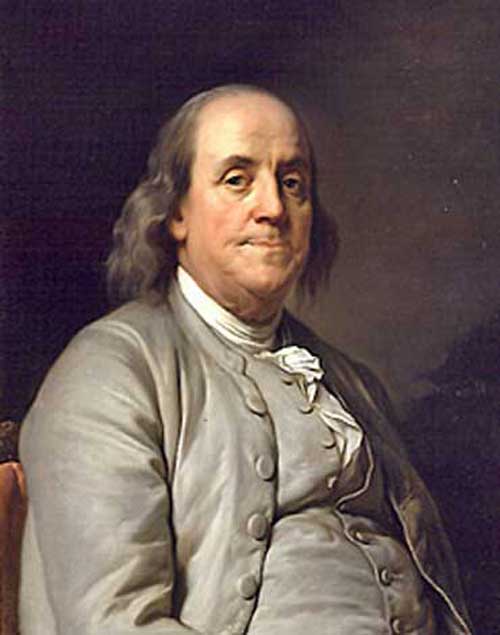
Self-improvement is a foundation of leadership. If leadership is to have meaning over time, to be sustainable, it requires continuous attention and effort.
This is not a new or novel idea.
Benjamin Franklin, one of the most famous of the American founders, wrote extensively about the need to engage in continuous self-improvement. His life’s work can be seen as an ever expanding act of leadership and service, built upon his own project of self-improvement, reaching ever greater numbers of others.
From the vantage point afforded by the distance of two centuries, we recognize the value and relevance of Franklin’s project. One might well say that self-improvement is part of our national DNA. It is a recurring strand of practical idealism that makes us unique, renders us one.
In the article that follows, Daniel R Murphy distills the essence of the Franklin method. —JMS
Benjamin Franklin, Father of the American Self-Improvement Ethic
Between 1771 and 1783 Benjamin Franklin wrote his Autobiography. It contains a great deal that you would profit from and is only about 175 pages long. Franklin could be called the grandfather of self-improvement literature in the United States. His Poor Richard’s Almanac series included many stories and bits of advice for the common man. It was in fact a collection of Yankee wisdom accumulated for decades.
Perhaps the most interesting and potentially useful part of Franklin’s autobiography is his description of his self-improvement project. As a young man Franklin quickly came to understand his own weaknesses and the weaknesses of those around him that led to their failure. He was a keen observer and quickly also learned those habits that led to success.
In response he devised a system for self-improvement, based on a series of virtues. He implemented them on a weekly basis. Here that method is explained for your benefit. Try Dr. Franklin’s method and see how you might incrementally improve yourself today.
Franklin’s Famous Chart
In his twenties he set out to improve himself in a measurable, accountable manner. He first ascertained the qualities that he found most important to cultivate: Temperance, Silence, Order, Resolution, Frugality, Industry, Sincerity, Justice, Moderation, Cleanliness, Tranquility, Chastity and Humility. He then devised a simple daily record and chose one of these virtues each week to focus upon. His record contained a matrix as follows:
| Sun | Mon | Tue | Wed | Thur | Fri | Sat | |
| T. | |||||||
| S. | * | * | * | * | |||
| O. | ** | * | * | * | * | * | |
| R. | * | * | |||||
| F. | * | * | |||||
| I. | |||||||
| S. |
And so it continued. While the table is not totally reproduced here, it is started, and continued with all of the virtues beginning with T (temperance). Each asterisk, which was actually a dot made in ink, represented a failure on his part to maintain the virtue selected that week. His goal was to keep each week clear of any such dots.
Franklin Transformed Himself from a Roughly Hewn Stone to a Finely Polished Gem
Franklin used this method off and on for several years until he had perfected many of the virtues to the extent this method permitted. While Franklin would have been the first to admit he never achieved perfection in any of these virtues, he also was known to have mastered a number of them. As a young man, for example, he was known to be brash, argumentative and rude. Over time he came to understand how contrary that kind of behavior was to his own success. Through repeated self-discipline and efforts such as these to modify his own habits and behavior he became a man of great understanding. He became known for being a good listener, rarely one to offer his own opinion and a man who everyone liked and admired.
By making these changes to himself Franklin became wealthy, retiring in his early 40s, and then went on to become an internationally celebrated scientist, statesman and inventor.
You Too Can Use Franklin’s Method
You too can use Franklin’s method of reflection upon your own conduct and habits and efforts to modify them.
First decide what you would like to strive to change about yourself. Find what you most want to improve upon in your habits, behaviors and practices. Then make a list and decide to focus upon one such item of improvement each week or month. Franklin chose a week as it seemed neither too short nor too long. You might do the same. Reflect each night before you retire on your day’s activities and mark down any failures you might have experienced or any remarkable success in your changed behavior. Each morning focus upon what you plan to change and resolve to do so.
You will also find more success in this effort if you carry your little notebook about with you and refer to it often during the day, both to remind yourself about what you seek to improve upon, and to make sure you do not forget to record your success or failure.
You will find, as did Franklin, that while you will not likely achieve perfection, you will change yourself in ways that will amaze you and will pay off handsomely in your future success.
Try Benjamin Franklin’s method of change and improvement. It is simple and will not cost you a dime.
Daniel R Murphy | Benjamin Franklin Self-Improvement Project
